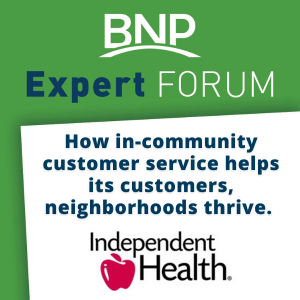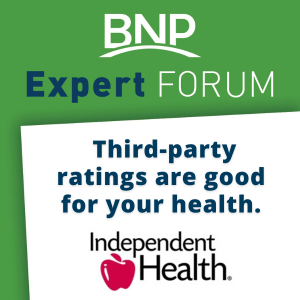Expert Forum: Health savings accounts can be an appealing benefit to younger employees
August 1, 2022
Blog Categories
By James Kress, Manager-Account Management, Large Group Sales | Independent Health
With employee resignations and job openings currently at levels not seen for more than 20 years, employers are struggling to find ways to attract and retain high-skilled workers. In order to survive and thrive during the “Great Resignation,” it’s become more imperative than ever for companies and businesses to provide a wide range of employee benefits.
Over the past several years, there has been a dramatic shift in the workplace from baby boomers (age 58-76) to millennials (age 26-41). As of the third quarter of 2021, 66.9% of baby boomers are now retired, according to the Pew Research Center. More than 1 in 3 American workers (35%) are millennials, making them the largest generation in the U.S. labor force. It is estimated that number will grow to as much as 75 percent by 2025. Millennials are the most likely generation to switch jobs, too. Therefore, employers have had to reconsider what types of benefits appeal to today’s workforce.
When it comes to health benefits, millennials aren’t interested in more expensive traditional plans. Since they typically have fewer health care expenses, millennials prefer a plan that comes with lower premiums/payroll deductions rather than one with lower out-of-pocket expenses. However, they also understand that their medical expenditures will eventually increase as they get married, start a family, and grow older.
For employers, offering a lower-costing high deductible health plan with a funded health savings account (HSA) has become an important part of their overall benefit strategy and recruitment and retention efforts. That’s because HSAs provide their employees with greater flexibility and control over their health care spending, along with substantial tax advantages and investment opportunities that allow them to accumulate wealth in the longer term.
HSAs and employer contributions
An HSA is a tax-advantaged account savings account owned by an individual that can be used to pay for qualified medical expenses for the owner and their dependents. Any unused dollars carry over year-to-year, regardless of whether the account owner changes health plans, retires, or leaves their job. Plus, the account holder can invest unused dollars in mutual funds for retirement. These benefits will appeal to your entire workforce, especially millennials. According to Benifitfocus, 76 percent of millennials eligible for an HSA have enrolled in one.
An HSA may be funded by pre-tax contributions from the employee, from the employer, or both. Employer contributions are a great way to increase use and satisfaction of an HSA-qualified health plan. The Internal Revenue Service (IRS) allows employers to fund part or all of the annual HSA contribution maximums, which is $3,650 (single coverage) and $7,300 (family coverage) for 2022. As with 401Ks, employers are also allowed to match employee contributions to encourage their own investment in their future, as long as the combined amounts don’t exceed the IRS annual maximums.
If you offer both a 401K and an HSA, your employees can grow both accounts together and potentially set themselves up for a more comfortable retirement. They also have until the tax filing deadline (typically April 15) to make catch-up contributions to their HSA for the previous year. This gives them more time to maximize the triple-tax benefit of an HSA (contributions are tax-free, withdrawals are tax-free, and interest grows tax-free).
Conclusion
When you consider the premiums for most HSA-qualified plans are lower than traditional health plans, and you also factor in the 7.65% FICA tax savings that accompany employer contributions, funding an HSA for your employees may be easier than you think. As your workforce sees their HSA accounts grow over time, so too will their appreciation of your benefit package.
If you are interested in learning more about the many benefits of an HSA, Independent Health is here to help. Since 2019, we have partnered with HealthEquity, the leading administrator of HSAs in the nation. Through this collaboration, Independent Health is the only health plan in Western New York that offers an integrated HSA product with complete automated enrollment and claims payment solutions as well as no monthly maintenance fees.
Visit our website to learn how we’re making it easy for employers and their employees to manage, use and maximize an HSA.
Disclaimer: HSAs are never taxed at a federal income tax level when used appropriately for qualified medical expenses. Also, most states recognize HSA funds as tax-free with very few exceptions. Independent Health does not provide legal, tax, financial or medical advice. Therefore, please consult a tax advisor regarding your state’s specific rules.
ABOUT THE AUTHOR:
As Manager of Large Group Existing Sales for Independent Health, Jim Kress has more than 27 years of health insurance experience. He has been involved with introducing and educating local employers and their employees on the value of HSAs since their inception in 2003. Plus, as a health care consumer, he’s been enrolled in an HSA-qualified high deductible plan for more than six years. Jim is a graduate of Penn State University and holds a bachelor’s degree in business administration.
Disclaimer: The above commentary entails the views of the author and not necessarily the views of the Buffalo Niagara Partnership.
Related Posts
Expert Forum: How in-community customer service helps its customers, neighborhoods thrive.
More than ever, healthcare organizations must connect customers with services that provide value, while understanding their concerns on a local level. Superior customer service can support everything from business retention to brand promotion and improved access to healthcare options.
Expert Forum: Third-party ratings are good for your health.
Third-party ratings are a good predictor of how satisfied employers and their employees will be with their health plans, and how well they may be taken care of when they need services. Learn the key factors behind the NCQA rating system, and discover why Independent Health is at the top.
Expert Forum: Key questions employers should ask before choosing group health coverage
Several studies underscore the cost of poor health on worker productivity, including a 2018 study by the Integrated Benefits Institute which found costs related to lost productivity from illness amounts to $530 billion annually, or 60 cents for every dollar employers spend on health coverage.
Expert Forum: Will a sports injury, genetics, or overactivity affect me or my child as we age?
You might not think about it when you’re a teen or young adult, but the orthopaedic injuries we experience in our youth can have implications later in life. Your genetic makeup may also play a factor in joint deterioration or mobility as you get older, but it’s not all doom and gloom: You or your child CAN make a full recovery and also take steps to stay healthy as you age! Here are some common scenarios that Excelsior Orthopaedics treats people for every day.




